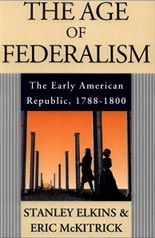« A Wrinkle in Time - Madeleine L’Engle | Home | Benjamin Franklin - Walter Isaacson »
May 17, 2004
The Age of Federalism - Elkins and McKitrick
- "Virtually a Republican measure . . . giving the President the authority to designate as alien enemies any citizens or subjects of hostile nations residing in the United States whose presence he regarded as dangerous, and to make regulations for their apprehension, restraint or removal as the case might require."
- Major political controversy surrounds the creation of a large "New Army", trained and equipped for the military demands of a new century.
- Judicious leaks of confidential government documents damage the reputation of political opponents in the public eye.
Ripped from today's headlines? Not quite. These are all episodes from American politics in the 1790s!!! They are all described in detail in the bookThe Age of Federalism, the Early American Republic, 1788 - 1800. Authors are Stanley Elkins and Eric McKitrick.
I don't use the term magisterial often, but this book deserves it! This book shows why it is worthwhile to study history.
Be forewarned that this volume is 754 pages of text, plus notes. However, the writing is lucid, witty and often funny. There is one anecdote about B. Bache, Ben Franklin's grandson, who became a major pro-Federalist journalist in Philadelphia. Unfortunately, he was a rather obnoxious character who earned the local nickname Lightning Rod Jr.
Each chapter can be read almost as an individual case study of a particular issue, so you can take your time working through the whole volume. I took 3 months to make it all the way through. The unifying thread is the personal and ideological conflict between Alexander Hamilton and Thomas Jefferson. During Washington's two terms as president, old George served as a senior, steady hand to moderate between these two strong characters.
Once Washington retires, the gloves come off and party politics, although still not called that until Jackson's time, begins in earnest.
There are several fascinating digressions in the book. One is an essay describing the cultural basis of 200+ years of total misunderstanding of each other between the Yanks and the French. Another explores the impact on the cultural life of America to this day of the decision to create a capital out of a swamp, in a separate place from where the business and artistic life of the country already thrived. It was symbolic of the ideological importance of not being like London, the source of all oppression of the Colonies.
There are also sharp profiles of many of the characters of the period. You'll also learn why Princeton, not Harvard or Yale, was the real academic birthplace of the Revolution.
So, read this book. You will lean a lot and like it, too.
Posted by mvestrich at 10:25 PM
to History
1 Comments
Mark, at 750 pages of text and 170 pages of notes, this book is definitely not light reading! I did buy it however and I plan to get through it, though I'll take your advice and work on just one chapter at a time. Thanks for the recommendation!
Posted by: elise on June 3, 2004 3:41 PM

I apologize for the inconvenience, comments are closed. ~Elise